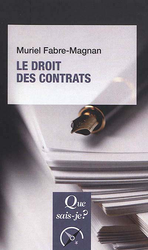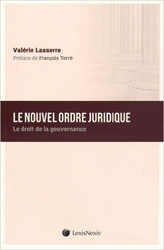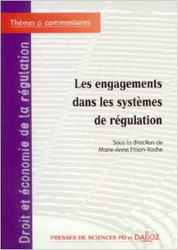Feb. 2, 2023
Thesaurus : Doctrine

► Full Reference: E. Wennerström, "Quelques réflexions sur la Compliance et la Cour européenne des droits de l'homme" ("Some Reflections on Compliance and the European Court of Human Rights"), in M.-A. Frison-Roche (ed.), La juridictionnalisation de la Compliance, coll. "Régulations & Compliance", Journal of Regulation & Compliance (JoRC) and Dalloz, 2023, p. 479-489.
____
📕read a general presentation of the book, La juridictionnalisation de la Compliance, in which this article is published
____
► Summary of the article (done by the Journal of Regulation & Compliance): The development of the European Court of Human Rights case law, contributing to European integration, has incorporated the substantial concept of "compliance" which goes beyond the idea of legality with respect to which companies remain passive, and promotes legal orders as systems in interaction with another.
The author develops the spirit and scope of Protocol 15 by which both the principle of subsidiarity and the margins of appreciation the signatory States are organized, mechanisms governed by the principle of proportionality. Subsidiarity means that the States are in the best position to design the most adequate application of the Convention, the close links between the States allowing its effective application. In addition, the new opinion procedure which allows a national court to have during a case the non-binding opinion of the ECHR ensures better compliance with the objectives of the Convention.
The case-law of the Court takes up this substantial requirement through its doctrine, in particular identified in the Bosphorus case, by stressing that the accession of a State to the European Union presumes its compliance when implementing EU law with the obligations arising from the ECHR, even if this presumption can be refuted if the protection is manifestly lacking, which was admitted in several cases, in particular concerning the right to an impartial tribunal in matters of economic regulation. The different legal orders are thus articulated.
The author concludes that the European Court of Human Rights, like the Court of Justice of the Union, contributes to the construction of Compliance Law in Europe, from an Ex Ante perspective favoring opinions rather than Ex Post sanctions and creating, in particular through the Bosphorus doctrine, elements of security and confidence for European integration around common values.
________
Jan. 13, 2022
Thesaurus : Doctrine

► Full Reference: E. Wennerström, "Some Reflections on Compliance and the European Court of Human Rights", in M.-A. Frison-Roche (ed.), Compliance Jurisdictionalisation, Journal of Regulation & Compliance (JoRC) and Bruylant, coll. "Compliance & Regulation", to be published.
____
📘read a general presentation of the book, Compliance Jurisdictionalisation, in which this article is published
____
► Summary of the article (done by the Journal of Regulation & Compliance): The development of the European Court of Human Rights case law, contributing to European integration, has incorporated the substantial concept of "compliance" which goes beyond the idea of legality with respect to which companies remain passive, and promotes legal orders as systems in interaction with one another.
The author develops the spirit and scope of Protocol 15 by which both the principle of subsidiarity and the margins of appreciation the signatory States are organized, mechanisms governed by the principle of proportionality. Subsidiarity means that the States are in the best position to design the most adequate application of the Convention, the close links between the States allowing its effective application. In addition, the new opinion procedure which allows a national court to have during a case the non-binding opinion of the ECHR ensures better compliance with the objectives of the Convention.
The case-law of the Court takes up this substantial requirement through its doctrine, in particular identified in the Bosphorus case, by stressing that the accession of a State to the European Union presumes its compliance when implementing EU law with the obligations arising from the ECHR, even if this presumption can be refuted if the protection is manifestly lacking, which was admitted in several cases, in particular concerning the right to an impartial tribunal in matters of economic regulation. The different legal orders are thus articulated.
The author concludes that the European Court of Human Rights, like the Court of Justice of the Union, contributes to the construction of Compliance Law in Europe, from an Ex Ante perspective favoring opinions rather than Ex Post sanctions and creating, in particular through the Bosphorus doctrine, elements of security and confidence for European integration around common values.
___
🦉This article is available in full text to those registered for Professor Marie-Anne Frison-Roche's courses
________
Nov. 4, 2021
Publications

► Full Reference: M.-A. Frison-Roche, " Assessment of whistleblowing and the obligation of vigilance regarding international competitiveness", in M.A. Frison-Roche (ed.), Compliance Monumental Goals, series "Compliance & Regulation", Journal of Regulation & Compliance (JoRC) et Bruylant, 2023, p.
____
► Article Summary: Taking up the legal tools of Compliance and confronting them with the concern that Law must have for the Competitiveness of companies, it is necessary that these legal instruments not harm it because Compliance Law, because of its immense ambitions, can only function through an alliance between political wills with great pretensions (save the planet) and the entities which are able to achieve these goals (the crucial economic operators : the political drawing on the compagnies" power, it would be contradictory for the legal instruments put in place by Law to harm the ability of companies to face global economic competition, or worse to favor international competitors acting under legal systems which do not integrate Compliance obligations.
From this principle, it is possible to assess these two legal techniques of whistleblowing and vigilance obligation: both consist in capturing Information, which gives them a strong uniqueness and fits them into the global competition for Information.
Taking the whistleblowing, its first beneficiary is the company itself since the firm discovers a weakness and can therefore remedy it. Therefore, beyond the principle of protection of the whistleblower by their access to the legal statute, for instance the one conceived by the French 2016 law known as "Sapin 2", it is questionable that all the incentives are not put in place so that the holder of such information transmits it to the manager. It is not the European solution, even after the European Directive of 2019, national legal systems continuing to require the absence of financial compensation, the "heroic figure of the whistleblower and the refusal of their remuneration depriving the company of Information and improvement. First to the manager, with external transmission taking place if the latter does nothing, the internal manager is thus encouraged to act and put an end to the dysfunction, which increases the competitiveness of the company.
But the French legislation has on the contrary developed the right incentive as to the person to whom the information is transmitted because by obliging to transmit first to the manager, the external transmission intervening if the internal management does nothing, the incentive is thus made to the internal manager to act and put an end to the dysfunction, this legal solution increasing the competitiveness of the company.
Even more, and even if it seems counter-intuitive, the obligation of vigilance increases the competitiveness of the obliged companies. Indeed, Law by obliging them to prevent and fight against violations of human rights and the environment has tacitly given them all the necessary powers to do so, notably the power to collect Information on third-party companies, including (and even above all) those which are not subject to transparency obligations. In this respect, companies, as far as they are personally responsible, hold supervisory power over others, a power which allows to globalize Compliance Law and which, in the process, increases the Companies' own power. Therefore, the obligation of vigilance is in many respects a boon for the companies which are subject to it. The resumption of the mechanism by the next European Directive, itself indifferent to the territory, will only strengthen this global power of vigilant companies over possibly foreign companies which become its passive subjects.
____
🚧 read the bilingual Working Paper, basis for this article
____
____
► read the presentations of the other Marie-Anne Frison-Roche's contributions in this book:
📝Compliance Monumental Goals, beating heart of Compliance Law,
📝Definition of Principe of Proportionality and Definition of Compliance Law,
📝 Role and Place of Companies in the Creation and Effectiveness of Compliance Law in Crisis,
__________
Nov. 28, 2019
Conferences

Reference : Frison-Roche, M.-A., General presentation of the cycle of conferences on Les outils de la Compliance (Compliance Tools) and "Théorie générale de la cartographie des risques" (Legal Theory of Risk Mapping), conference made in French, in Département d'Economie de Sciences Po & Journal of Regulation & Compliance (JoRC), La cartographie des risques, outil de la Compliance (Risk Mapping, as Compliance Tool), November 28th, 2019, Sciences Po, Paris.
- Read the General Presentation of the serie Régulations & Compliance in which the book will be published
Summary of the conference
Risk mapping is both central to the obligations or practices of companies and little apprehended by the legal systems. It is not expressly referred to by the French legal system, except for the special national laws known as "Sapin 2" and "Vigilance". But if we are out of this field, because there is only a description and not a legal definition, even less a legal notion, we do not know what legal regime to apply to the action of mapping risks. It is therefore useful, indeed compelling, to define the legal concept of risk mapping. Starting from what is still the safest ground, namely these two special laws, to go towards less secure legal grounds, such as the doctrine of the authorities or the commitments of the companies, even the ISO certifications obtained in this matter. Through a few judicial decisions and legal reasoning, a legal notion of the action of mapping risks emerges.
It is advisable to proceed in 5 steps (the working document follows another approach).
The first, based directly on the two available laws, apprehends the action of mapping when it comes into execution of a special legal obligation. The decision rendered in 2019 by the French Commission des sanctions of the Agence Française Anticorruption (French Corruption Agency's Sanctions Commission) draws probate games as to the demonstration of the execution of the obligation and the probationary system can be extended. In the same way the decision of the French Conseil constitutionnel (Constitutional Council) in 2017 on the "Vigilance Act" shows that a mechanism referred to as a "modality" is legitimate with regard to the goal, which is, concerning this tool, the establishment of a responsibility for others. It is therefore the concern for the situation of others that can be targeted by the Law thanks to Compliance Tool, especially Risk Mapping.
The second theme aims to map risks as a fact of good management for a company, while the enterprise is not constrained by a legal obligation. This fact is a paradox because the Regulatory Authority and the Judge may, where the conduct that was to be prevented occurs, for example a market abuse or an anti-competitive behavior, either qualify as an aggravating circumstance or as an attenuating circumstance. Consideration of the theory of incentives should lead to the adoption of the American solution, that is to say the qualification of an effective cartography as a mitigating fact. European case law is not yet fixed, especially in terms of Competition Law's compliance.
The third theme is the mapping action carried out by an entity which, in doing so, exercises power over a third party. Because cartography is as much an obligation as a power, possibly on a third party. The Conseil d'Etat (French Council of State) in 2017 qualified risk mapping as an act of grievance, but doing so legitimately, since it was to prevent forest fires efficiently. This solution based on the teleology attached to Compliance Law can be transposed to other areas.
Going further, one may consider transforming this action from de facto status to legal status on the part of the company, if it thus identifies risks for third parties. It would thus give third-party creditors the right to be in a position to measure the risks that weigh on them. Risk mapping would thus be part of a broader unilateral commitment by powerful companies, recognizing the existence of risks for third parties to enable them to know their nature and extent. If this responsibility Ex Ante (characteristic of Compliance Law) is fulfilled, then the Ex Post liability of the company could no longer be retained. This is the ongoing issue of the Johnson & Johnson trial (2019 American judgment), in terms of medical compliance. Because if one can argue that there exists through this kind of risk mapping that the posology a "subjective right to be worried about the risks related to the taking of the drug", the patient remains free in the use of it. The question of whether third-party education is included in the mapping, since the alert is already included in it, is an open question. For now, the answer is negative.
Indeed and in a fifth time, appears the liberal definition of Compliance Law through the apprehension that the Law must make of the cartography of the risks. Beyond the rational act that any person has to control their risks for their own interest, by preventing the damaging effects of that from the crystallization of risk has in fact proved, it is a question of preserving an external interest for the preservation of which the Law must intervene because the subject of law, in particular the company will be less likely to be concerned.
By the imprint of the law, risk mapping expresses the concern for an external interest, either of a system or of a third party. But this support in Ex Ante implies force (Sapin 2, Vigilance, financial market information obligation) or will (social responsibility, ethical commitment, adoption of non-financial standards) relates only to information, its constitution, its intelligibility and its hierarchy. Then it is the actors exposed to the risks, able to understand in Ex Ante the extent as far as they are concerned, either the entity itself, or the thirds, to choose to run them to no.
- Consult the two sets of slides as basis of the conference:
- Slides served as basis for the General Presentation of the cycle of conference on the Compliance Tools (in French)
- Slides served as basis for the specific contribution "Théorie générale de la cartographie des risques / Legal Theory of Risk Mapping" (in French).
______
June 6, 2018
Thesaurus : Doctrine

Référence complète : Fabre-Magnan, M., Le droit des contrats, coll. "Que sais-je ?", ed. PUF, 2018, 128 p.
« On lie les bœufs par les cornes, et les hommes par les paroles », disait le juriste Loysel en 1607. Toute l’ambivalence du contrat est là. En échangeant leurs paroles, les hommes s’engagent et se lient les uns aux autres. Par leur parole encore, ils peuvent se projeter dans l’avenir et tenter d’avoir prise sur lui. Enfin, en respectant la parole qu’ils ont donnée, ils lui confèrent sa valeur, déterminant la nature de la relation qu’ils ont nouée avec les autres.
Le « droit des contrats » désigne ainsi le « droit des obligations librement consenties », en d’autres termes le droit des engagements volontaires. Mais la liberté de se lier ne serait-elle pas un oxymore ?
Au droit revient la tâche de canaliser et de garantir la parole donnée, et ce faisant d’articuler tous les mots qui disent le contrat, à commencer par la liberté, la volonté, la force obligatoire, la loi et, bien sûr, la justice.
March 21, 2016
Thesaurus : 03. Conseil d'Etat
Aug. 5, 2015
Thesaurus : 01. Conseil constitutionnel
Extrait de la décision :
"le 2° de l'article 39 est relatif à la création d'une procédure d'injonction structurelle dans le secteur du commerce de détail en France métropolitaine ;
28. Considérant que le 2° de l'article 39 donne une nouvelle rédaction de l'article L. 752-26 du code de commerce pour permettre à l'Autorité de la concurrence de prononcer, sous certaines conditions, en France métropolitaine, des injonctions structurelles imposant la modification des accords ou la cession d'actifs d'une entreprise ou d'un groupe d'entreprises, en cas d'existence d'une position dominante et de détention d'une part de marché supérieure à 50 % par cette entreprise ou ce groupe d'entreprises exploitant un ou plusieurs magasins de commerce de détail ; que l'Autorité de la concurrence peut enjoindre à l'entreprise ou au groupe d'entreprises en cause de modifier, de compléter ou de résilier, dans un délai déterminé qui ne peut excéder six mois, tous accords et tous actes par lesquels s'est constituée la puissance économique qui se traduit par des prix ou des marges élevés ; qu'elle peut, dans les mêmes conditions, lui enjoindre de procéder, dans un délai qui ne peut être inférieur à six mois, à la cession d'actifs, y compris de terrains, bâtis ou non ;
29. Considérant que les députés et sénateurs requérants soutiennent que l'article L. 752-26, tel que modifié par l'article 39, méconnaît le droit de propriété, dès lors que la cession forcée d'actifs ou la résiliation forcée de conventions en cours dans un délai déterminé ne peuvent se réaliser que dans des conditions défavorables pour l'entreprise ; que, selon eux, il résulte de cet article une atteinte à la liberté d'entreprendre qui n'est pas justifiée par une situation particulière de la concurrence en France métropolitaine ; qu'ils font également reproche à la loi de porter atteinte au droit au maintien des conventions légalement conclues ; qu'enfin, les députés requérants font grief à l'article L. 752-26 de méconnaître le principe de légalité des délits et des peines ainsi que l'objectif d'accessibilité et d'intelligibilité de la loi ;
30. Considérant que la propriété figure au nombre des droits de l'homme consacrés par les articles 2 et 17 de la Déclaration de 1789 ; qu'aux termes de son article 17 : « La propriété étant un droit inviolable et sacré, nul ne peut en être privé, si ce n'est lorsque la nécessité publique, légalement constatée, l'exige évidemment, et sous la condition d'une juste et préalable indemnité » ; qu'en l'absence de privation du droit de propriété au sens de cet article, il résulte néanmoins de l'article 2 de la Déclaration de 1789 que les atteintes portées à ce droit doivent être justifiées par un motif d'intérêt général et proportionnées à l'objectif poursuivi ;
31. Considérant qu'il est loisible au législateur d'apporter à la liberté d'entreprendre qui découle de l'article 4 de la Déclaration de 1789 des limitations liées à des exigences constitutionnelles ou justifiées par l'intérêt général, à la condition qu'il n'en résulte pas d'atteintes disproportionnées au regard de l'objectif poursuivi ;
32. Considérant qu'en adoptant le 2° de l'article 39, le législateur a entendu corriger ou mettre fin aux accords et actes par lesquels s'est, dans le commerce de détail, constituée une situation de puissance économique portant atteinte à une concurrence effective dans une zone considérée se traduisant par des pratiques de prix ou de marges élevés en comparaison des moyennes habituellement constatées dans le secteur économique concerné ; qu'il a ainsi poursuivi un objectif de préservation de l'ordre public économique et de protection des consommateurs ; que, toutefois, d'une part, les dispositions contestées peuvent conduire à la remise en cause des prix ou des marges pratiqués par l'entreprise ou le groupe d'entreprises et, le cas échéant, à l'obligation de modifier, compléter ou résilier des accords ou actes, ou de céder des actifs alors même que la position dominante de l'entreprise ou du groupe d'entreprises a pu être acquise par les mérites et qu'aucun abus n'a été constaté ; que, d'autre part, les dispositions contestées s'appliquent sur l'ensemble du territoire de la France métropolitaine et à l'ensemble du secteur du commerce de détail, alors même qu'il ressort des travaux préparatoires que l'objectif du législateur était de remédier à des situations particulières dans le seul secteur du commerce de détail alimentaire ; qu'ainsi, eu égard aux contraintes que ces dispositions font peser sur les entreprises concernées et à leur champ d'application, les dispositions de l'article L. 752-26 du code de commerce portent tant à la liberté d'entreprendre qu'au droit de propriété une atteinte manifestement disproportionnée au regard du but poursuivi ; que, par suite et sans qu'il soit besoin d'examiner les autres griefs, le 2° de l'article 39 est contraire à la Constitution ; qu'il en va de même du 1° de ce même article, qui en est inséparable ;
May 20, 2015
Thesaurus : Doctrine

Référence complète : Lasserre, V., Le nouvel ordre juridique. Le droit de la gouvernance, préf. Terré, F., LexisNexis, 2015, 358 p.
Dec. 14, 2011
Thesaurus : Soft Law
Lire la réponse faite par EDF, publiée par l'Autorité de la concurrence
La réponse qui émane du service juridique d'EDF est très réservée.
Elle rappelle que le respect du droit de la concurrence est une obligation légale.
Jan. 27, 2006
Publications

Référence complète : Frison-Roche, M-A., Article introductif de Les engagements dans les systèmes de régulation, série "Droit et Économie de la Régulation", Dalloz-Presses de Sciences po, 2006.
Les engagements sont une notions-clé en droit et en économie, mais les regards sont rarement croisés. Ainsi, les juristes manient depuis toujours la notion de contrat, tandis que les économistes n’intègrent guère la dimension juridique de l’engagement. La première partie de l’ouvrage reprend plutôt les catégories économiques, en s’appuyant sur l’opposition "ex ante/ex post", l’engagement étant du côté du premier, ce qui caractériserait la régulation par rapport à la garde de la concurrence. Les expériences montrent que si d’origine l’ex ante est conçu pour laisser place à l’ex post, on connaît des glissements de l’ex post vers l’ex ante.
Nov. 5, 2004
Thesaurus : Doctrine

► Référence complète : A.-S. Dupré-Dallemagne, La force contraignante du rapport d'obligation (Recherche sur la notion d'obligation), préf. Ph. Delebecque, Presses universitaires d'Aix-Marseille, Institut de Droit des Affaires, 2004, 536 p.
____
____
📗lire le sommaire de l'ouvrage
____
📗lire la table des matières de l'ouvrage
____
► Résumé de l'ouvrage (fait par l'éditeur) : "Le rapport d'obligation embrasse de très nombreuses situations. Son champ d'application s'élargit tant par son objet que par les personnes qui en sont tenues. Il présente une nature juridique unique malgré la diversité des sources dont il est issu : qu'il soit de nature contractuelle, quasi-contractuelle, délictuelle ou quasi-délictuelle, le rapport d'obligation oblige son auteur à en exécuter les termes. La force contraignante est inhérente au rapport d'obligation créé. Par conséquent, à défaut d'exécution volontaire, le créancier peut contraindre le débiteur à l'exécution.
La force contraignante, bien qu'inhérente au rapport d'obligation, présente des degrés. Atténuée, elle entraîne une suspension voire une suppression de l'exécution normalement attendue par le créancier. Consolidée, elle octroie au créancier une plus grande garantie d'exécution.".
________
June 4, 2003
Publications

► Référence complète : Frison-Roche, M.-A., Valeurs marchandes et ordre concurrentiel, in L’ordre concurrentiel, Mélanges en l'honneur d'Antoine Pirovano, éd. Frison-Roche, 2003, pp.223-233.
___
📝Lire l’article.
📕 Lire la présentation générale de l'ouvrage
_____
Résumé de l'article : Dans une conception moins défavorable à l'ordre économique que celle adoptée par la plupart des auteurs de l'ouvrage, hostile par principe aux mécanismes marchand, il s'agit de montrer que les marchés n'excluent pas toute valeur, n'ont pas dans leur indifférence les ennemis.
Ils n'en sont pas non plus les protecteurs naturels, puisque les valeurs n'y auront plus place que si elles présentent une utilité dans la mécanique des marchés.
Mais si cela est le cas alors l'efficacité de ce qui est d'une façon exagérée désigné comme l'ordre concurrentiel car il convient plutôt de se référer à un ordre économique va soutenir ces "valeurs". Il en est ainsi de la parole donnée, socle des contrats, qui est aussi le socle des "engagements" dont les marchés ont besoin, tandis que les marchés ont également besoin de la fidélité dont la parole donnée n'est qu'une forme, la clientèle en étant une autre, et plus encore de l'impartialité.
Tant d'exigences que le droit lui-même peut satisfaire, notamment parce qu'il se soucie d'autre chose que de la satisfaction économique immédiate, la confluence des deux buts pouvant alors aider le droit dans sa protection de la personne.
_________________